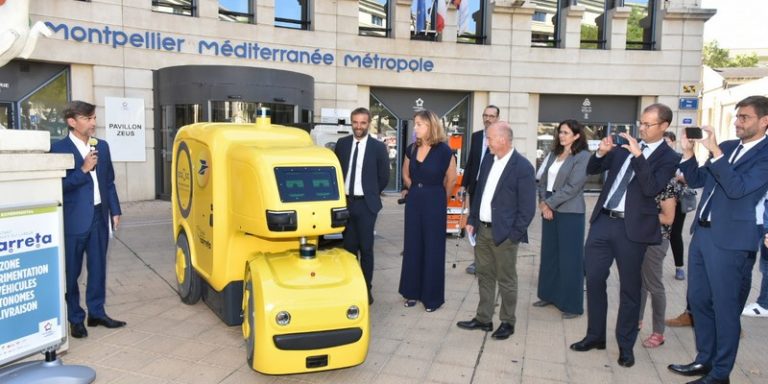
While the RATPis launching its first experiments with an autonomous bus line, the city of Montpellier is in turn launching an experiment with an automated vehicle dedicated to urban logistics. The Carreta project will be coordinated by Montpellier Méditerranée Métropole with the help of many complementary partners such as TwinswHeel, a start-up from the Occitanie region that designs and manufactures logistics vehicles in Cahors. This initiative is one of the 16 experiments selected by the state for autonomous vehicles.
The Carreta project, one of the 16 experiments related to autonomous vehicles
The Carreta project is the only autonomous vehicle project selected at the national level among the 16 experiments selected by the state on the theme of urban logistics. It was launched on September 17 with the presence of :
- Michaël DELAFOSSE, Mayor of Montpellier, President of Montpellier Méditerranée Métropole
- Anne-Marie IDRAC, High Representative of the Government for the development of automated vehicles
- Camille FABRE, Deputy Regional Director of ADEME
- Philippe DORGE, Deputy Director General of the La Poste Group
- Vincent TALON, Co-founder of TwinswHeel
- Philippe GACHE, Director of the CARA transport system and intelligence programme
- Armelle PERRIER, Sustainable Development Director, STEF Group
The objective of the initiative: to test an innovative and sustainable solution for the delivery of goods in the city in order to evaluate its maturity and relevance from a technological, environmental, usual, economic, social and societal point of view. This solution takes the form of an automated vehicle dedicated to logistics. The mayor of Montpellier and president of Montpellier Méditerranée Métropole said of the project:
“Montpellier is a territory of innovation and research, boosted by its “Smart City” strategy and its investments in decarbonized mobilities. We are honored to host Carreta, one of the 16 national autonomous vehicle experiments in France and the only project on the theme of urban logistics. The autonomous vehicle will never replace human contact, but it can provide a valuable new tool to reduce the impact of logistics activities in the heart of the city and structure new industries.”
As for the funding, €500,000 in subsidies came from the State for TwinswHeel and €100,000 was provided by Montpellier Méditerranée Métropole. The project partners, in addition to TwinswHeel, are CARA, a competitiveness cluster with expertise in collective passenger and freight transport, STEF, a specialist in temperature-controlled transport and logistics services, the La Poste Group, Mobis, Mines-Télécom d’Alès, the University of Montpellier and the Cit.Us international chair.
A three-phase project to allow the autonomous droid to acclimatize to its environment and use cases
The vehicle itself is called “droid”. It is a terrestrial robot that evolves in the middle of humans and whose primary function is the carrying of heavy loads. The tool comes to assist the Men in order to allow them to be freer in their movements and in their displacements. For the largest models, the TwinswHeel droids can carry loads ranging from 40 to 500 kilograms. They are always accompanied by a safety driver at a distance of a few meters and travel at a speed of 6 km/h, i.e. at a walking pace.
For 36 months, these vehicles will be tested on parcel and courier delivery missions for La Poste, and fresh food products for STEF. They will be used in the Antigone district and will then move on to the historic heart of Montpellier. The Carreta project is divided into three phases:
- As of September 17, the first phase of the program aims to validate all of the technological building blocks of the autonomous logistics vehicle in order to validate its operational safety and functionality, in particular its ability to map, recognize defined routes and detect possible obstacles.
- In 2022, the second phase aims to validate the behaviour of the autonomous vehicle in relation to its traffic environment and its ability to respond to operational constraints relating to schedules, routes and other specificities of La Poste and STEF use cases.
During the first two phases, the vehicle will drive empty in the streets of Montpellier in order to collect a maximum of data and to adapt the vehicle’s behaviour according to the feedback.
- The third phase will consist in carrying out a full-scale test, in real conditions of use. The autonomous logistics vehicle will transport goods to validate its suitability for STEF’s and La Poste’s use cases.
According to all the participants in the project, this experiment will make it possible to evaluate the interest and impact of automated urban logistics and thus to measure the societal and economic interest as well as the acceptability by the populations of the use of autonomous droids.
Translated from Dans le cadre d’une expérimentation, Montpellier accueillera prochainement des véhicules autonomes dédiés à la logistique









